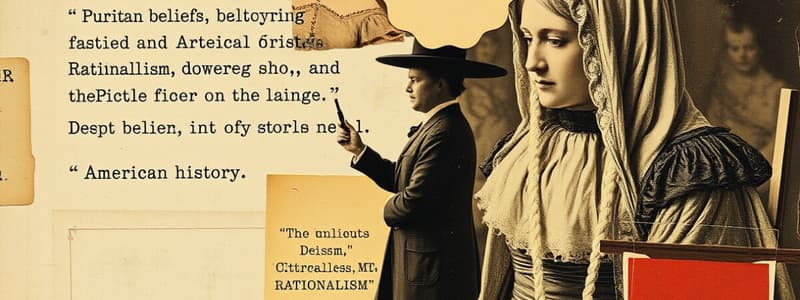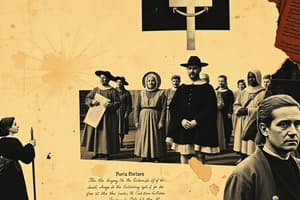Podcast
Questions and Answers
What was Cotton Mather known for?
What was Cotton Mather known for?
- Promoting the idea of reason over faith
- Writing the first Bible in America
- Developing a method for smallpox inoculation (correct)
- Building schools for Puritan children
How did the Puritans view the relationship between the everyday world and the spiritual world?
How did the Puritans view the relationship between the everyday world and the spiritual world?
- They believed they were entirely separate.
- They thought the everyday world was a distraction.
- They saw them as deeply intertwined. (correct)
- They considered the spiritual world superior.
What impact did European diseases have on Native American populations?
What impact did European diseases have on Native American populations?
- They led to increased trade with Europeans.
- They gained immunity and thrived.
- They resulted in stronger alliances with settlers.
- They caused significant population declines. (correct)
Which philosophical movement believed in discovering truth through logic rather than religious faith?
Which philosophical movement believed in discovering truth through logic rather than religious faith?
What was the primary business venture for the Puritans in North America?
What was the primary business venture for the Puritans in North America?
How were the first interactions between Europeans and American Indians characterized?
How were the first interactions between Europeans and American Indians characterized?
What did rationalists believe about human nature?
What did rationalists believe about human nature?
What was a significant outcome of the European arrival to North America for the Native Americans?
What was a significant outcome of the European arrival to North America for the Native Americans?
What were the Puritans primarily engaged in when they settled in New England?
What were the Puritans primarily engaged in when they settled in New England?
What was one of the defining features of Deism?
What was one of the defining features of Deism?
What primary motivation did the Puritans have for sailing to Plymouth?
What primary motivation did the Puritans have for sailing to Plymouth?
Which of the following statements best describes the beliefs of Deists?
Which of the following statements best describes the beliefs of Deists?
What term is used to describe the rationalist view of God as a creator who does not intervene in the world?
What term is used to describe the rationalist view of God as a creator who does not intervene in the world?
What did the Mayflower Compact establish for the Puritan settlers?
What did the Mayflower Compact establish for the Puritan settlers?
How did Puritans view the Bible in relation to their worship?
How did Puritans view the Bible in relation to their worship?
What was a key difference between Puritans and Rationalists?
What was a key difference between Puritans and Rationalists?
What was one significant outcome of the Rationalist mindset during the Age of Reason?
What was one significant outcome of the Rationalist mindset during the Age of Reason?
What role did Alvar Nunez Cabeza de Vaca have in his expedition?
What role did Alvar Nunez Cabeza de Vaca have in his expedition?
Flashcards are hidden until you start studying
Study Notes
Puritans and Their Beliefs
- Puritans sailed to New England to practice their religion free from persecution.
- They viewed the Bible as the ultimate guide for worship and lived according to its demands.
- Believed in predestination and a mysterious God interacting with the universe.
Deism and Rationalism
- Deists accept a creator God but deny His ongoing interaction with the universe.
- Deism is founded on skepticism, rationalism, and nature observation.
- Deists prioritize reason over revelation, valuing human happiness and good deeds as worship.
Rationalist Philosophy
- Rationalists liken God to a clockmaker, creating the universe then letting it operate independently.
- They emphasize logic and reason, eschewing traditional religion and intuition.
- This mindset contributed to the Age of Reason and influenced the Declaration of Independence.
Alvar Nunez Cabeza de Vaca
- Served as treasurer of an expedition; his narratives documented American Indian customs.
- His accounts serve as important historical evidence of indigenous life and practices.
Puritan Legacy
- Puritans were English Protestant Christians, establishing a unique cultural and religious legacy in America.
- On the Mayflower, they created the Mayflower Compact, outlining their governance structure.
Cotton Mather and Smallpox
- Cotton Mather innovated inoculation as a method to combat smallpox.
- He exemplified a blending of strict Puritanism and scientific inquiry, challenging stereotypes of Puritans.
Early American Society
- By 1640, approximately 20,000 English Puritans had migrated to New England, merging commerce with spirituality.
- Interaction between Europeans and American Indians fostered mutual learning and dependence, particularly in survival skills.
Impact of European Diseases on Native Americans
- European diseases decimated Native American populations, who lacked immunity due to their historical isolation from these pathogens.
- The epidemic led to significant loss of life among Indigenous peoples and decreased their necessity for alliances with settlers.
European and Indigenous Interactions
- Initial contact involved trading goods and sharing survival techniques.
- European settlers exchanged firearms and textiles for Native American agricultural knowledge and materials.
Historical Context
- European explorers arrived in the Americas over 500 years ago, where diverse Indigenous groups had long established their communities.
- The early interplay between these cultures shaped the foundational social and economic interactions in America.
Studying That Suits You
Use AI to generate personalized quizzes and flashcards to suit your learning preferences.




